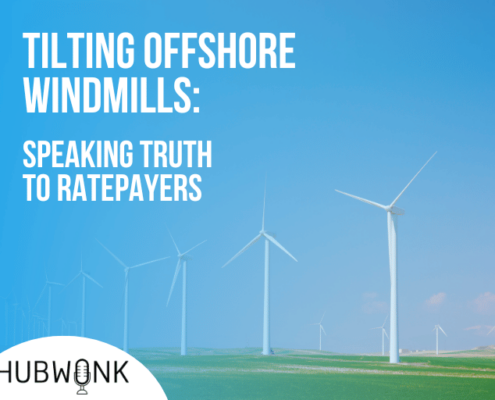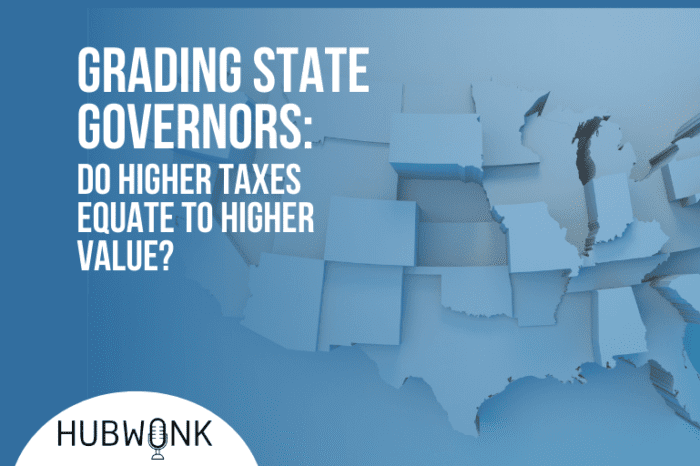Grading State Governors: Do Higher Taxes Equate To Higher Value?
/in Economic Opportunity, Featured, Podcast Hubwonk /by Editorial Staff
This week on Hubwonk, host Joe Selvaggi talks with Cato Institute’s Chris Edwards about the new report he co-authored entitled, “Fiscal Policy Report Card on America’s Governors 2022.” They discuss how Massachusetts Governor Charlie Baker’s fiscal stewardship compares with other states, and explore whether higher tax rates and spending correlate with better state performance and resident satisfaction.
Guest
 Chris Edwards occupies the Kilts Family Chair in Fiscal Studies at Cato and is the editor of Down?siz?ing?Gov?ern?ment?.org. He is a top expert on federal and state tax and budget issues. Before joining Cato, Edwards was a senior economist on the congressional Joint Economic Committee, a manager with PricewaterhouseCoopers, and an economist with the Tax Foundation. Edwards has testified to Congress on fiscal issues many times, and his articles on tax and budget policies have appeared in the Washington Post, the Wall Street Journal, and other major newspapers. He is the author of Downsizing the Federal Government and coauthor of Global Tax Revolution. Edwards holds a BA in economics from the University of Waterloo and an MA in economics from George Mason University. He was a member of the Fiscal Future Commission of the National Academy of Sciences.
Chris Edwards occupies the Kilts Family Chair in Fiscal Studies at Cato and is the editor of Down?siz?ing?Gov?ern?ment?.org. He is a top expert on federal and state tax and budget issues. Before joining Cato, Edwards was a senior economist on the congressional Joint Economic Committee, a manager with PricewaterhouseCoopers, and an economist with the Tax Foundation. Edwards has testified to Congress on fiscal issues many times, and his articles on tax and budget policies have appeared in the Washington Post, the Wall Street Journal, and other major newspapers. He is the author of Downsizing the Federal Government and coauthor of Global Tax Revolution. Edwards holds a BA in economics from the University of Waterloo and an MA in economics from George Mason University. He was a member of the Fiscal Future Commission of the National Academy of Sciences.
Get new episodes of Hubwonk in your inbox!
WATCH:
Read a Transcript of This Episode
Please excuse typos.
Joe Selvaggi:
This is Hubwonk. I’m Joe Selvaggi.
Joe Selvaggi:
Welcome to Hubwonk, a podcast of Pioneer Institute, a think tank in Boston. Do higher state taxes equate to better services and increased resident satisfaction? A new report from Cato Institute entitled Fiscal Policy Report Card on America’s Governor’s 2022 seeks to answer that question. In the biannual survey of state governor’s leadership on tax policy across all 50 states, the data compares the revenue each state collects to the quality of services provided to see if a positive correlation exists between higher taxes and better services. Indeed, this question mirrors one Massachusetts voters must consider on November 8th with ballot question one, which imposes an income surtax on high earners with the promise that more revenue will equate to better public education and transportation. Where such higher state taxes correlated with higher resident satisfaction, the case for a tax increase would be on solid footing. If instead states with higher tax rates compared less favorably and higher state tax rates offered no relative benefit.
Joe Selvaggi:
Indeed, if the strong net out migration from high tax states is taken to be a measure of resident dissatisfaction, then the argument for higher state tax rates loses its foundation. My guest today is Chris Edwards, the Kilts Family Chair in fiscal studies at Cato Institute, and a top expert on federal and state tax and budget issues. Mr. Edwards is co-author of the Cato’s State Governor’s Report card, and has researched and written extensively on state’s comparative fiscal health and performance. Chris will share with us the observations of his paper, including giving a report card grade to our outgoing Governor Baker, and offer his insight into ways residents can vote to reshape their tax regime to deliver a more transparent and valuable state government that attracts new residents and cultivates at prosperous economy. When I return, I’ll be joined by Cato Institute’s, Chris Edwards. Okay, we’re back. This is Hubwonk. I’m Joe Selvaggi, and I’m now pleased to be joined by economist and chair of fiscal studies at Cato Institute, Chris Edwards, welcome to Hubwonk, Chris.
Chris Edwards:
Hey, thanks a lot for having me, Joe.
Joe Selvaggi:
Okay, Chrisexcited about today’s conversation about your ratings of 50 state governors. But before we dive into our topicgive our listeners a sense of how you became an expert in state fiscal policy, particularly in relative rankings of state fiscal policy.
Chris Edwards:
I actually started in examining state and local budget policies 30 years ago at a tax foundation in Washington, DC here. And then I spent a number of years at Price Waterhouse dealing with corporate tax issues. I went up to Capitol Hill, dealt with federal tax issues, and the last two decades have been a Cato dealing with federal, state, and local fiscal issues. So I’m pretty I’m pretty well rounded in dealing with tax and spending issues.
Joe Selvaggi:
Absolutely. You’ve earned your stripes. SoI think our conversation is particularly relevant because we have an election coming up. So I enjoyed reading your recently released project about rating all 50 states or effectively all 50 governors. We here in Massachusetts will soon on election dayless than a week after this will be released, be choosing a new legislator, a new governor, for sure. We also have a ballot measurequestion one. It’s on the ballotasking voters to decide whether we’ll have a surtax on the income of high earners. What I liked about your report is it reminds us here in the Bay State that we are not the only state in the union, but rather, we compete with other states for the best and the brightestthe people, the companies, the industries that, that make us prosperous. Your report does a good job of comparing them to each other. What was your goal in creating this report that rates all 50 states?
Chris Edwards:
Well, Cato’s been doing our report every two years for quite a while. We look at the tax and spending records of the nation’s governors. It has struck me often that governors and legislatures that spend a lot of money often get kudos from the mainstream media. And I thought, you know what? It makes sense to actually give a pat on the back to governors who have tried their best to run a lean governmentto let citizens keep as much money keep as much of their own tax money as they can. So our report cardit’s based on sort of hard databut we give the highest grades to the governors who have restrained spending the mostcut taxes, and it gives the lowest grades to the governors who have increased taxes and spending the most. And there is a pretty dramatic difference between the best governorsand the worst governors from our point of view in the nation.
Joe Selvaggi:
As they say, we’re all 50 laboratories of democracyand coming up with our policies that are best for our populations. But why, I mean, that’s a fairly normative statement. Is thereother than folks don’t like taxes or some folks do like taxes and spending, why do you see a benefit to fiscal restraint for an individual state?
Chris Edwards:
Well, one thing that really strikes me in studying the 50 states is that there’s no obvious advantage in having bigger government. You know, if you take the biggest government state, New York and you compare it to some of the smallest government states like Florida and or South Dakota or New Hampshire New Yorkers pay a heck of a lot more in taxes, and they don’t get better services. It’s, it’s hard to define the quality of services, but for example you know, in New York, the tax burden as a share of income is twice as big as the tax burden, as a share of income in Florida which is, is remarkable. But if you look for example, at the quality of K K12 schools Florida schools on most of the state comparisons are actually better than New York schools. If you, if you look at the level of bureaucracy in New York versus Florida you can go to the Census Bureau and you can see this information directly.
Chris Edwards:
New York, for example they have 31% more bureaucrats in their K12 schools. They’ve got twice as many people in solid waste or garbage collection is Florida. Their welfare bureaucracy has three times as many employees as Florida. Their highway system in New York has twice as many employees as the highway system in Florida. It’s remarked. So these differences are really big and dramatic. I mean, in my view, residents of states like New York, frankly, are being ripped off by their governments. And I really wish that more residents of New York would sort of awaken to the idea that they’re paying a lot more and they’re really not getting their value for money in terms of government services.
Joe Selvaggi:
So you give us a lot to, to unpack there. So let’s, let’s dilate a little bit and pull back. I liked a, a particularly provocative piece. You wrote recently pointing out that actually, in fact, 11 of our 50 states don’t even have income taxes at all. I think those here in Massachusetts assume it’s, it’s what the rate will be, not whether it will exist. Share with our listeners, why or how is it that 11 states somehow manage to not tax the income of their residents?
Chris Edwards:
So actually, there’s nine states now that don’t have individual income taxes. Two of them are sort of exceptional states, Wyoming and Alaska, because they have a lot of energy industry related revenues. So if you put that, those two states aside, there are seven states. Florida, Texas, Wyoming, New Hampshire, South Dakota, Tennessee, may have missed one or one or two there. They, they don’t have individual income taxes. And their overall size of government is smaller than the other 40 or so states. They run a leaner government. I, in studying those states and reading many news articles about the state budgeting in those states I do not find any kind of outcry for bigger government. Those states run a leaner government. They, they generally have a very good school systems. They have good highway systems. They provide all the basic services that some of the bigger government states provide, but at a lower cost are more efficient. If you look for example, at there’s been studies on how much it costs each of the states to build a mile of interstate highway. The, the differences between the states are pretty dramatic. So I think we can learn a lot by comparing the states and comparing the efficiency with which government works.
Joe Selvaggi:
So we in that list of note packs states is one just to our north less than an hour drive from here in Boston New Hampshire Governor Sun Nunu, I think got an a on your, on your report. How does a state with no income tax pay its bills? It’s, as you say, it’s, it’s leaner, it’s meaner, but it must get money for roads somewhere. So how does a state with no income tax function?
Chris Edwards:
Well, the, the states generally, and I looked at the data recently in a Cato article, and the states that have no individual income taxes do tend to have somewhat higher sales taxes and property taxes. However, their overall size of government is lower. So it’s a combination of some of the other taxes are a little higher, but overall they run a leaner government. New Hampshire actually has two substantial business taxes, which I don’t think is a good idea, but that’s how they partly fund their government. And they have substantial property taxes in New Hampshire. New Hampshire as your viewers in Massachusetts, I’m sure know, has a really interesting state and local government, much different than than other states where they have a very decentralized power in Massachusetts. The local governments have a lot more sort of fiscal power than, than state level governments.
Chris Edwards:
And I think that’s a good idea as well, I think government closer to the people tends to work more efficiently. Citizens can keep better tab on it. And one other thing I would say you know, generally about, I think eliminating a major tax base, like the individual income tax and relying on say, just a general sales tax, like South Dakota does makes a lot of sense in terms of the citizens being able to understand how much their government costs and in, in, and understanding their relationship with the government. So if, if you don’t have an individual income tax, but you say the a statewide sales tax, let’s say 7%, you know, the citizen knows that the state government costs about 7%. And, and that’s useful information. I, so governments like to have as many complicated tax bases a as they can to try to, you know, hit citizens from every side in terms of raising revenue. But from the citizen’s perspective, that’s not a good idea. From the citizen’s perspective, you want the state government to have a, a single simple sort, sort of flat rate tax that hits everyone equally. So there’s sort of taxpayer solidarity, and so that citizens can understand the basic cost of government,
Joe Selvaggi:
Indeed. And if it’s a sales tax that’s hitting you every time you make a purchase, rather than on one day of the year, April 15th, when we all don’t enjoy filling out our tax forms. So I think that that would be fair. I just to put a even finer point on it, we’re making generalizations about the states with no income tax in general. I don’t wanna put words in your mouth. Those states in general also have more lean, mean, efficient government. So it’s, there’s a, a direct correlation between a sales an income tax and the size of that state’s government.
Chris Edwards:
Oh, oh, that’s absolutely right. And, and, you know, you raised you know, the issue of Massachusetts and you’re, you’re facing this referenda this, or a ballot question, this November. One thing I would point out, if you look at the data on Massachusetts, Massachusetts is kind of an average size government compared to the other 50 states. It’s certainly not one of the most lean lean governments, but it’s also substantially smaller than, say, New York government. So you’re kind of in the middle. And yeah, even though the politics in Massachusetts have kind of trended to the left to some extent over the decades, I, I think that Massachusetts flat rate individual income tax is one thing that has kind of helped anchor the state and kept the government from becoming too big. You’ll find states like California, where they have these highly progressive graduated individual income taxes, they raise an enormous amount of money from the very highest group of, of, of citizens.
Chris Edwards:
So in California, the top 1% pay 50% of all income taxes. I don’t think that’s a good I don’t think that’s a good way to run your government. I think that the burden of state governments ought to be sort of fairly shared and proportional across the citizens. So you know, having a flat rate tax, I think makes a lot of sense. If you have a highly proportional tax, I think a state like Massachusetts, it’s gonna scare away a lot of its high earning and more entrepreneurial residents which ultimately hurts everyone in a state. And that’s something you find in the data. And, you know, we can talk about that in terms of, if you look at the interstate migration data, it is clear that that Americans and especially high income Americans are moving from the highest tax states, especially the ones that have high income tax rates to lower tax states. And the states that don’t have income taxes, that’s pretty clear in the data. So that’s a risk that Massachusetts would run if they raised their top income tax rate.
Joe Selvaggi:
So I wanna get back to that theme this notion that states compete for high income or let’s say high tax paying individuals. In general again, you, you do this report every two years. What have been the trends recently have, have states in general been raising taxes or have states in general become a lower taxes or, you know, getting to use the cliche leaner and meaner? What, what, what have they been doing, and why do you think they’re doing what they’re doing?
Chris Edwards:
So the general, the, you know, as the nation pulled out of a covid over two years ago now something really surprising happened, which was state budget surpluses started arising across the country. In the last two years, we’ve seen huge state budget surpluses that has led about 20 states to enact major tax reforms, to use the surpluses to take advantage of that and pass major income tax reforms, lowering income tax rates. So that’s been the main trend. I think that’s been a fantastic trend. So the smart governors and the smart legislatures in my view, understand that there’s states like Florida that are that, that are big draws for interstate migration, and they’re responding to that in sensible ways by trying to make their state tax system more attractive. So that’s been the main trend the last couple decades.
Chris Edwards:
And in ARC Cato Governor’s report card, I look in detail at state interstate migration data. The IRS actually tracks very closely every where people move to every year, about 3% of US households move to a different state every year. And if you look at the data in detail, it is clear that people are moving from the higher tax to lower tax states. So, for example, if you look at the 25 lowest tax states in the United States, 20 of them have net in migration. Of those nine no income tax states we talked about eight of them have net in migration. If you look at the, the IRS data breaks it down. People by income level, the highest income people are, are, have an even stronger propensity to move to the lower tax states and out of the high tax states.
Chris Edwards:
So, one, one data point on that, for example New York State has been draining draining residents to other states for decades now. New York loses two residents in oat migration every year for each one resident moving into New York State. But the highest income group in New York, they are losing three residents for each one moving in. And the, you know, the biggest flow of people in America is from New York to Florida. Some people will, will say, you know, well, people are just moving south to places like Florida, cuz it’s warmer and sunnier. But actually that the, the, the, the data shows that it’s clearly isn’t true either because New Hampshire has been a consistent and steady draw for, in migration over the decades. So has South Dakota whi, which has no income tax and one of the lowest tax burdens in the country, South Dakota has been a consistent in migration draw.
Chris Edwards:
And yet nearly all of its neighbors, if you look on a map, have a consistent out migration. So it is clear that that people are moving to lower tax states. It’s not the only reason why, of course, why people move to other states, but it, but I think it is an important factor to consider. And I think especially, and a last point on this, especially for the cold northern stage like Massachusetts, Massachusetts you know, Illinois that are, that are losing residents you’ve gotta be extra, you’ve gotta have an extra efficient and lean government if you wanna retain your citizens in the cold Northern states, because there is this natural draw for people to move south. So states like New York and Massachusetts have to have better, more efficient governments than states like Florida, if they wish to keep their citizens and especially their most productive and entrepreneurial citizens, if they want to retain those citizens and, and, and so that they don’t move out and move to some of the faster growing states.
Joe Selvaggi:
Is this an immediate effect? Meaning so we look at, let’s say state tax rates, they go up, they go down effectively, I’m assuming although I don’t know, when states in these most recent times have generally trended towards reducing their tax rates, Has it had the intended effect? And then the flip side is when, when certain states, let’s say California or Connecticut or New York, when they do impose taxes on high earners, does it indeed encourage not just people to leave, but those high earners to leave the people that they’re trying to tax? Are they the ones who, who respond, you know, most quickly, or I guess you would call it elasticity of, of of, of immigration?
Chris Edwards:
Well, you can approach this two ways. You can look at the data, and it seems to me just the raw, the raw data is pretty clear. But then the other thing that’s obvious, if you, I’ve been following news stories on these issues for many years, and it is clear when you get a high earner, like Eon Musk, for example, recently moved and and moved his company and moved his charitable activities from California to Texas because he got, you know, sick and tired of the high taxes and regulations in California. Often, especially those high earning entrepreneurs, we’ll say, you know, in public statements, you know, they got sick and tired of the high taxes in New York or Illinois or wherever, and that’s why they’re moving to Florida so often, you know, these anecdotes are, are pretty clear and wealthy people in particular will often mention that this is a, a real factor.
Chris Edwards:
I think this is something that high tax states and northern states need to really think about is when you lose, when high tax states lose someone who’s very entrepreneurial like Elon Musk the states lose that person’s income, of course, they often lose their, their, the, the person’s business activities. Elon Musk is moving most of his operations to Texas. The stories on Elon Musk suggest that he’s also moving his charitable activities to Texas. So you’ll find, if you look at philanthropy data, that wealthy people will often give a lot of money to Phil to charitable activities within their state. So, you know, Phil Knight of Nike Shoe, for example, has given hundreds of millions of dollars to charities within Oregon over the last couple decades. So when a wealthy person moves to a lower tax state, they’ll often move a lot of their philanthropy activities to their new home state.
Chris Edwards:
There’s the issue of venture capital, angel investment. Wealthy people are very important, not just because they start companies because, but because they fund startup companies. And so the reason why, you know, Silicon Valley is sort of a cluster, or one of the reasons is because wealthy people like to fund startups that are close to them in physical proximity. So they can keep tabs on these entrepreneurs. They’re funding. And I’ve looked into this in a study in detail at, at, at Cato. So when a wealthy person moves from a state like New York to Florida, there, there’s gonna be a tendency for them to start funding startup businesses in their new home home states. So, so that the the bottom line here, I think, is that when, when, when high tax states scare some of their high earning and productive citizens, they lose the income, they lose the entrepreneurial activities, they lose some of the philanthropic activities, and they lose some of the investment in startup businesses. So states lose a lot when they lose high earning citizens.
Joe Selvaggi:
So for our listeners who are regard high earners, perhaps they may think good riddens, I don’t, I don’t, I don’t need a bunch of rich people here. When we we intentionally discourage them from staying the dangers they take with them everything that goes along with their, their life, which is their charitable giving, their spending on all the services. But of course, the jobs they may create, which may be quite a few people who are, are aver income earners that also goes as they migrate outward.
Chris Edwards:
That, that that’s exactly right. That, that’s exactly right.
Joe Selvaggi:
So I wanna zoom in on we have 50 states, but our listeners most are situated here in Massachusetts. I noticed though we have I think the most popular governor in the nation with Charlie Baker and he’s a Republican. Your rating system gave him merely a C. So how do we reconcile a average rating with a popular government? Is there a disconnect between your scoring and voters satisfaction with, with their elected leader?
Chris Edwards:
So, it’s interesting, Joe, I, I actually looked at the popularity data and compared to the scores they got on the Cato Governor’s report card, and I actually don’t see too much of a correlation. You’re right. I think the governor of Massachusetts has been one of the most popular in the nation in the last few years, but also Chris San Nuno in next, in next door New Hampshire, who’s been one of the most sort of libertarian small government governors for many years now, who scored at the top of the Cater Report. He has also been one of the most popular governors in the nation. I will say that I, I think at the far end of the spectrum some of the governors who scored the worst, I mean, a good example is the governor of Oregon. She, she has she’s very, she’s generally has been one of the most unpopular governors in the nation.
Chris Edwards:
She, she’s pushed to raise taxes every year consistently. So I think if you have a governor that, that consistently pushes to hike taxes on, on average people year after year, you know, gas tax hikes and cigarette tax hikes and sales tax hikes they will be very unpopular. But I think governors like the governor of Massachusetts who were kind of, you know, they raised some taxes, they cut some other taxes, I think it’s maybe harder for people to figure out to figure out you know, what what the sort of the bottom line is. And, you know, the governor Maryland Larry Hogan is another interesting example. He, he’s very much a centrist. He’s been one of the most popular governors in the nation as a Republican and a Democratic state. He’s veto tax hike after tax hike, which may have led to his, his popularity, but on the other hand, he spent a lot of money which, you know, on my scoring wouldn’t, wouldn’t be wouldn’t be great, but he has resistant hiking taxes. So it’s a complicated, it’s a complicated stew here. And of course, taxes and spending are only part of the story about governor popularity.
Joe Selvaggi:
So our popular Governor Baker is leaving office, and we’re gonna get a new governor. I, we, as you we’ve mentioned a couple times here, we have a ballot initiative to create a surtax on high earners. I’m assuming if that were to pass, Massachusetts would get even a lower score than a C in the future. I, I, is that fair to assume?
Chris Edwards:
Well, what I, the, the, the Cato report just looks at the last three years of a governor’s activity. So whoever the this is, if this is citizen initiative and Baker’s not responsible, I guess that it wouldn’t be in the Cato scoring. But you know, there are other reports, one by the tax foundation that puts out a report every year on state business competitiveness, you know, how good states are in attracting entrepreneurs and businesses. And I, I would note that on that report, the Massachusetts actually does very poorly. I think Massachusetts is about 38. And you know, the thing about the individual income tax is most American businesses are actually not structured as corporations paying the corporate income tax. They’re structured as partnerships, sole proprietorships LLCs and s corporations that pay the individual income tax. So in Massachusetts, if, if it is to raise its top individual income tax, it actually is gonna hit tens or hundreds of thousands of businesses in the state, which would be very bad for the economy.
Chris Edwards:
And there is no doubt, I mean, we talked about how responsive individuals are moving from higher tax to lower tax states. There is no doubt that businesses do enormous amount of research and due diligence when they wanna set up new factories and research facilities. And they figuring out which state to to set up their new facilities. I, I think I think that there would be, you raise the top individual income tax rate in Massachusetts. You know, young entrepreneurs, I think would think twice about starting a business in the state. They can move next door to New Hampshire and not pay an individual income tax. So I I, I think it’s, so the issue is not just sort of hitting rich people, it is hitting business activity and, you know, you would risk driving business activity outta the state.
Joe Selvaggi:
Okay. Well you know, again, I I, we’ve had other guests on the show who have echoed your your observations or your speculation that it would, it would have in the long run a really detrimental effect on the state where we do to pass such attacks. But what would you say, again, I can imagine some of our listeners hearing this and saying, you know, higher taxes and spending is bad lower taxes and lower spending is good. What would you say to those who say, this is just simply a race to the bottom? Meaning if we’re all gonna, if every state’s gonna compete against every other state for zero tax low cost you know, wound, our schools crumble and our bridges fall down, what would you say to those who say this is all just a, a formula for a race to the bottom?
Chris Edwards:
So the first thing I, you know, I hope there is a race to the bottom in terms of income taxes. I don’t think states need income taxes. And as we just discussed, there are nine states that run their states quite well. Some of the best run states in the country don’t have income taxes. So I don’t think you need any, I don’t think state governments need income taxes. The way I think about it is, you know, the federal government has a very large income tax. The state governments, you know, can run their activities mainly with sales taxes, and then local governments can be funded mainly with property taxes. I actually think that would be a good system citizens could it would, they would better understand which, which state, which levels of government are responsible for, for which taxes. So I hope there is a race to the bottom in income taxes.
Chris Edwards:
I don’t see any as we sort of touched on, I don’t see any strong relationship between the quality of services and providing citizens and services they need and tax levels. Like I said, I think it states the high, the very highest tax states like New York, I think the residents are being ripped off, frankly. They, they are not getting quality services. Cato does a, another report called Freedom in the 50 State, where we look at individual freedoms in terms of economic freedom and social freedoms. New York is the least free state in the nation and it has a very high cost government. So New Yorkers are paying more and they’re getting less freedom. I don’t think that’s a good deal at all. So I would be happy if there was a race to the bottom in terms of eliminating individual income taxes at the state level,
Joe Selvaggi:
Which would be good news for almost everyone except let’s say current and prospective bureaucrats. So we’re getting close to the end of our time together. I’d like to ask always towards the end sort of the king for the day kind of question. Now, I’ll, I’ll, I’ll give you two ways to answer this, either. If you were the governor of the 51st state, let’s call it imaginary and you are, you have, let’s say, broad legislative authority and influence what would your state policy look like as far as tax revenue goes? What, what rate would it be and how would it be collected? Or if instead you want to answer, which state do you think most mostly models an ideal level of government or governance? Which, which governor do you think is doing it? Just about right.
Chris Edwards:
Yeah. I, I think a couple really good models of South Dakota and New Hampshire. You know, most of the revenue comes from the sales tax. I love New Hampshire because of its decentralized governmental structure. The government is closer to the people. I think that the, the single easiest and best reform for any state to make would be to repeal their corporate income. Tax states absolutely do not need corporate income taxes. The corporate tax burden ultimately just lands on individuals in the form of lower pay for workers or lower returns for shareholders or higher prices for consumers. So corporate taxes are really just a shell covering up the cost of government that lands on individuals and they’re damaging. And as I, I mentioned, there is no doubt that businesses do enormous research when they want to, when they’re opening new factories and facilities about where to locate you know, states every citizen should want their state to be able to attract businesses to create jobs and opportunity and income for individuals. I think corporate income taxes are really damaging. And actually they, they do a lot of damage, even though they hardly raise any money. The corporate state, corporate income taxes only raise about 3% of state revenues, and yet they do all this damage. So I think that that is the number one reform, I think, for state governments would be to repeal their corporate income taxes.
Joe Selvaggi:
Wonderful. Well, you, you’re singing our song here. I think again, we’ve made the point that corporations don’t pay taxes. People do either workers or right consumers. So it is an illusion to think we can collect from an imaginary legal construct. So again, appreciate you pointing that out. Well, Chris, this has been very informative. Where can our listeners find more about your writing, your research or this very interesting report ranking all of the governors to see where we fit and why?
Chris Edwards:
Well, I’m easy to find at cato.org, Cato Institute, or you can just Google my nameChris Edwards, and you’ll find all my recent writing on state and local government fiscal policy. Thanks a lot for having me, Joe.
Joe Selvaggi:
Well, I enjoy. Thank you very much for being on the show, Chris.
Joe Selvaggi:
This has been another episode of Hubwonk, a podcast of Pioneer Institute. If you enjoyed today’s episode, there are several ways to support Hubwonk and Pioneer Institute be easier for you and better for us if you subscribe to Hubwonk on your iTunes podcatcher. If you’d like to help make it easier for others to find Hubwonk, it would be great if you offer a five star rating or a favorable review. We’re always grateful. If you wanna share Hubwonk with friends, if you have ideas or comments or suggestions for me about future episode topics, you’re welcome to email me at hubwonk @ pioneerinstitute.org. Please join me next week for a new episode of Hubwonk.
Recent Episodes
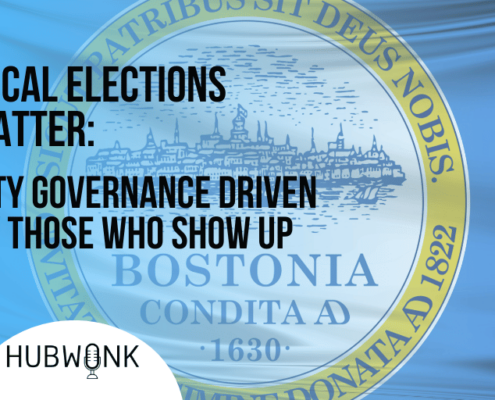
Local Elections Matter: City Governance Driven by Those Who Show Up
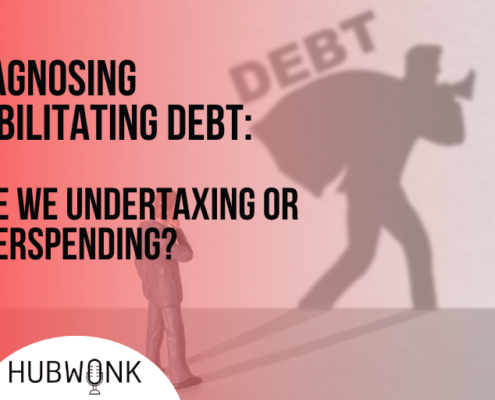
Diagnosing Debilitating Debt: Are We Undertaxing or Overspending?
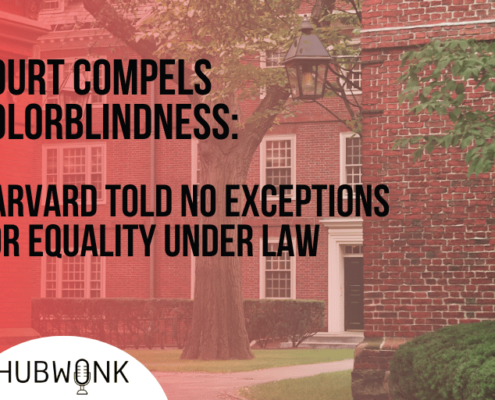
Court Compels Colorblindness: Harvard Told No Exceptions for Equality Under Law
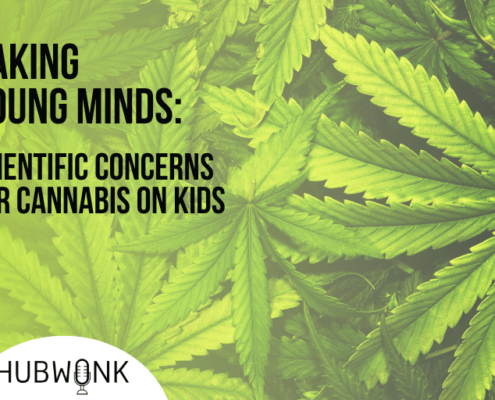
Baking Young Minds: Scientific Concerns for Cannabis on Kids
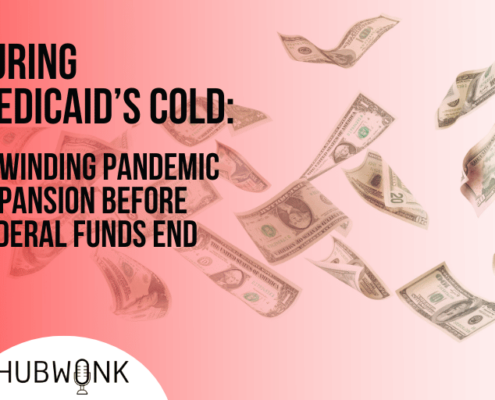
Curing Medicaid’s Cold: Unwinding Pandemic Expansion Before Federal Funds End
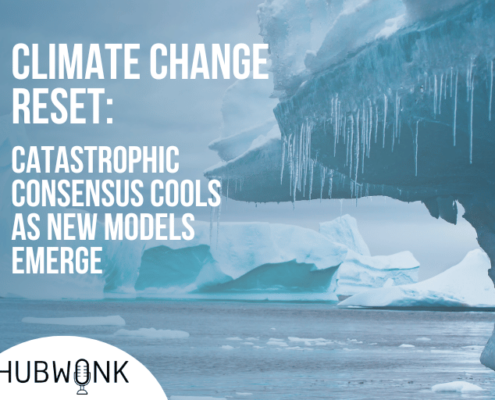
Climate Change Reset: Catastrophic Consensus Cools As New Models Emerge
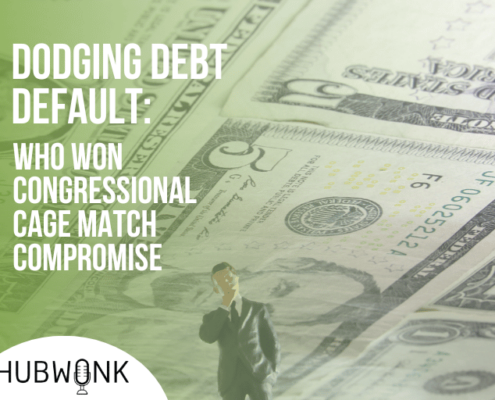
Dodging Debt Default: Who Won Congressional Cage Match Compromise
